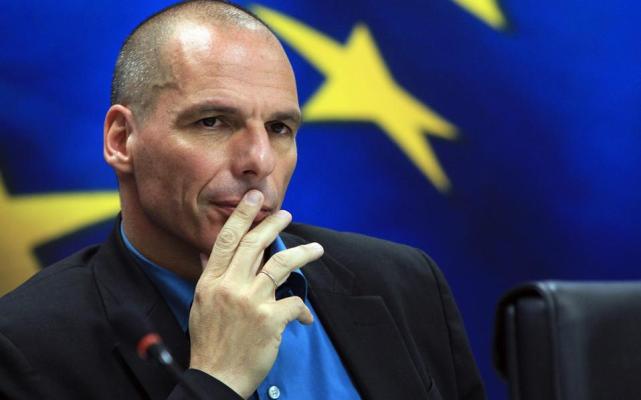As Athens blows through another deadline, a compromise agreement with the country’s European creditors looks further away than ever.
By Jamila Trindle, Foreign Policy
Greece is one step closer to running out of money, after a meeting of European finance ministers Friday closed without a deal or any indication that a compromise over a needed influx of bailout money was likely before the end of the month. The impasse is bringing Athens closer to default and the possible need to leave the eurozone.
Instead of an agreement that would unlock the next $7.8 billion in bailout money, both sides restated their cases at a meeting in Riga, Latvia, on Friday. Eurozone leaders reiterated that Greece needs to implement an array of fiscal reforms and budget cuts in order for the hundred-billion-dollar rescue spigot to stay open. Greek Finance Minister Yanis Varoufakis, meanwhile, said that failing to solve the crisis wouldn’t be good for Greece — or the rest of the countries in the currency union.
“A comprehensive and detailed list of reforms is needed,” Jeroen Dijsselbloem, the Dutch chairman of the Eurogroup of finance ministers, said at a news conference after the meeting, according to Reuters. “We are all aware that time is running out.”
Dijsselbloem dismissed the idea that Greece might get some smaller slice of bailout funds in exchange for a shortened list of concessions. And he also put a stake in the Greek government’s hopes that a deal would be forthcoming by the end of the month, saying that eurozone finance ministers would not consider the issue again until May 11. Though it’s unclear exactly when Greece would run out of cash, the lack of a deal in April means that the Greek government will have to go to even more desperate lengths to make upcoming debt payments and may even have to resort to IOUs to pay pensioners and public sector workers.
Varoufakis tried to paint the meeting in a positive light, saying that there had been “convergence” over the past few weeks and expressing confidence that a deal would come together quickly.
But his optimism was not reflected by his fellow European finance officials, some of whom, in the words of Bloomberg, dismissed him as “a time-waster, a gambler and an amateur.”
As negotiations with the European Union have dragged on since February, the Greek government has been quickly running out of cash. Athens drained financial reserves throughout the government, from the central bank to job centers, to make a $504 million payment to the International Monetary Fund earlier this month.
In an attempt to scrape together enough cash to pay public sector workers at the end of the month — and maybe even have enough left over to make the next $830 million debt payment to the IMF on May 12 — Greek Prime Minister Alexis Tsipras ordered local governments to move their money to the central bank on Monday. It’s unclear how much more barrel-scraping Greece can do.
The uncertainty is exacerbating Greece’s economic woes. People are pulling their money out of the banks, Greek bonds are losing value, and local leaders are angry about the central government taking their money. The plummeting value of Greek bonds is of particular concern because Greek banks use the bonds as collateral to gain essential emergency loans from the European Central Bank (ECB). If the ECB stopped accepting the bonds or took them only at a steep discount, Greece would quickly have a banking crisis on top of its debt crisis.
Tsipras continued his overtures to Moscow, holding meetings with state energy giant Gazprom this week. But that cap-in-hand campaign has yet to yield results, except to anger European leaders that Greece is negotiating with Russia. Tsipras already irked European officials in late March by criticizing EU sanctions on Russia over Ukraine. While Russian President Vladimir Putin didn’t turned down the opportunity to meet with Tsipras and rile his European neighbors, he has not yet offered to sail to Greece’s rescue with an emergency loan, either.
As Greece stumbles toward default and a possible forced exit from the euro bloc, speculation has turned to what that might mean for the rest of the world. While German officials have signaled for months that a goodbye for Greece might not be that bad of a thing, U.S. officials are a little more worried. A White House economic advisor warned Tuesday that a “Grexit” wouldn’t just be bad for Europe, but could shake the global economy’s fragile recovery.
“A Greek exit would not just be bad for the Greek economy, it would be taking a very large and unnecessary risk with the global economy just when a lot of things are starting to go right,” Jason Furman, chairman of the White House Council of Economic Advisers, told Reuters.









